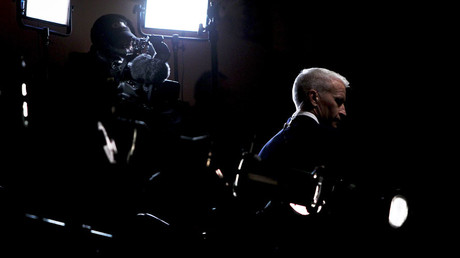Fake news? Nobody does it better than the West
Robert Bridge is an American writer and journalist based in Moscow, Russia. His articles have been featured in many publications, including Russia in Global Affairs, The Moscow Times, Lew Rockwell and Global Research. Bridge is the author of the book on corporate power, “Midnight in the American Empire”, which was released in 2013. email: robertvbridge@yahoo.com

The United States has a curious way of accusing outsiders of carrying out nefarious activities – cyber warfare, international spying and unwarranted aggression, for example – which in fact the US undertakes better than anybody.
And so it is with the latest bit of Orwellian-speak being hurled at those who would dare contradict the Western narrative with what is being called - drum roll - “fake news.”
The Washington Post was recently forced to distance itself from an astonishingly sloppy article that cited research from a little-known group that calls itself PropOrNot. This outfit, the members of which prefer to remain conveniently anonymous, conducted the equivalent of a modern-day Inquisition against 200 websites that, in its opinion, “echoed Russian propaganda.”
I guess it never occurred to these people that this echo effect could mean the whole world is experiencing one giant awakening at about the same time.
In any event, since much has already been written about that preposterous piece, not least of all byGlenn Greenwald and Matt Taibbi, for my own part I will go out on a limb and say we have not heard the end of “fake news” allegations. Not by a long shot. That nagging suspicion was confirmed by anarticle in ZeroHedge - one of the 200 heretical websites, incidentally, that were dragged over the hot coals in the hit piece.
“On November 30, one week after the Washington Post launched its witch hunt against 'Russian propaganda fake news', with 390 votes for, the House quietly passed 'H.R. 6393, Intelligence Authorization Act for Fiscal Year 2017', sponsored by California Republican Devin Nunes (whose third largest donor in 2016 is Google parent Alphabet, Inc), a bill which deals with a number of intelligence-related issues, including Russian propaganda, or what the government calls propaganda, and hints at a potential crackdown on 'offenders.'"
Here’s the really jaw-dropping part of the article: “Curiously, the bill which was passed on November 30, was introduced on November 22, two days before the Washington Post published its Nov. 24 article citing "experts" who claim Russian propaganda helped Donald Trump get elected.”
How’s that for coincidence?
US Media's 'Madame Tussauds'
As should be expected, no other collection in the world houses more fabulous forgeries than the US Mainstream Media.
By now everybody knows why Hillary Rodham Clinton lost the 2016 presidential election in a landslide to the billionaire developer Donald Trump. No, it wasn’t because she used her family’s private email server when sending documents marked ‘classified’ during her tenure as US Secretary of State, thus prompting an FBI investigation.
No, it wasn’t because WikiLeaks showed that the Democratic National Committee had worked against Bernie Sanders to ensure Clinton got the royal nod.
No, it wasn’t because former CNN contributor Donna Brazile had fed debate questions to the Democratic candidate.
No, none of these astounding factors, we are patiently, repetitively told, had anything remotely to do with Clinton’s shock defeat. And to believe otherwise would be, well, siding with the Russians. That's right, according to unsubstantiated allegations, Russia “hacking the US elections” was largely responsible for causing Clinton’s sensational defeat. A truly remarkable feat by the cunning Russians, considering that US voting machines are not hooked up to the Internet, and in many cases are tallied by paper ballots!
So what is the proof for these very serious allegations, which have the potential to torpedo US-Russia relations long into the future? Would you believe nothing? To quote that standard bearer of fake-free news, the Washington Post, who in turn is quoting one of those always-convenient anonymous (fake?) officials: “The official cautioned that the intelligence community is not saying it has “definitive proof” of such tampering, or any Russian plans to do so. “But even the hint of something impacting the security of our election system would be of significant concern,” the official said.
There is probably also a "hint" - if we dug deep enough - that some pimply teenager in his suburban New Jersey bedroom is "impacting the security of our election system"instead of doing his homework, but somehow it seems saner and more logical to suggest nuclear-powered Russia is the real hacker.
Go figure.
False pretexts for real wars
On August 2, 1990, after Iraq invaded Kuwait the United States began mobilizing its military forces for its first attack against Iraq, which was codenamed Operation Desert Shield. And like the 2003 invasion, the Gulf War, as it was called, required some heavily applied grease before the American people would accept it.
The American public, however, was not anxious to send its young men and women into foreign combat to free a nation it could not locate on a map. Therefore, Bush the Elder would need to convince the nation that Saddam Hussein, who just recently was Washington’s staunch ally against Iran, was now the root of all evil and the people of Kuwait could not be allowed to suffer under such a brutal regime. Such mental gymnastics are not easy to pull off. So how could Washington gather support for "liberating" a country – Kuwait - that did not share America’s sense of democratic values? How could the war appear to be more than an opportunistic move to seize Iraq’s massive oil?
“Every big media event needs what journalists and flacks alike refer to as 'the hook,'" wrote John Stauber and Sheldon Rampton in their book, ‘Toxic Sludge is Good for You.’ “An ideal hook becomes the central element of a story that makes it newsworthy, evokes a strong emotional response, and sticks in the memory.”
Markets are always right: Fake news is freedom; pushing real news on the public is the road to serfdomtheguardian.com/media/2016/apr…
So the Bush administration did what any honest government would do in search of a jolly short war: It hired a PR agency, Hill & Knowlton, to invent and sell the no-fail hook. The end product was perhaps the most egregious lie ever told on behalf of war and conquest.
On October 10, 1990, a 15-year-old Kuwaiti girl, known only by her first name of Nayirah, gave a presentation before the UN Human Rights Caucus that was worthy of an Oscar. Crying, she described what she had apparently witnessed in a hospital in Kuwait City. Her testimony was passed out in a media kit prepared by Citizens for a Free Kuwait. "I volunteered at the al-Addan hospital," Nayirah said. "While I was there, I saw the Iraqi soldiers come into the hospital with guns, and go into the room where ... babies were in incubators. They took the babies out of the incubators, took the incubators, and left the babies on the cold floor to die."
Incredible? Yes. In fact, too incredible.
What the media failed to inform us was that Nayirah was a member of the Kuwaiti Royal Family. Her father, Saud Nasir al-Sabah, Kuwait's Ambassador to the US, was even in the room as she gave her testimony, while “H&K vice-president Lauri Fitz-Pegado had coached Nayirah in what even the Kuwaitis' own investigators later confirmed was false testimony,” Stauber and Rampton reported.
Thirteen years later, Bush the Younger, having witnessed first-hand how effective a good lie could be, sold the world in 2003 a second war against Iraq on the false claim that President Saddam Hussein was hoarding weapons of mass destruction.
And woe to the country – like Jacque Chirac’s France - that expressed heated opposition to the war plans.
The Voice of America captured the wave of media-generated anti-French sentiments in the run up to the outbreak of war in March 2003: “The New York Post newspaper ran a doctored front page photo in which the heads of the French and German ambassadors to the United Nations had been replaced with the heads of weasels furry mammals synonymous with treachery and sneakiness. Radio disc jockeys in Atlanta offered listeners the chance to smash a Peugeot automobile with a sledge hammer… One of America's most popular political commentators, Bill O'Reilly, suggested that Americans vent their outrage by boycotting French goods.”
As it turned out, of course, the French were absolutely right to condemn America’s mad rush to war. The US media, behaving more like a government mouthpiece than an organization for establishing some semblance of truth, either ‘dropped the ball’ or executed their duties wonderfully, depending on who you ask.
Serving as town crier for military action, the New York Times largely relied on just one source, and a Pentagon source at that – the late Iraqi opposition leader Ahmed Chalabi – to sell the story that Hussein was indeed creating and stockpiling a noxious horde of weapons. As it turned out, Chalabi's information was wrong, tragically wrong. Only after foreign boots were on the ground in Iraq, however, did the hand-wringing, apologetic articles begin to come out of the woodwork.
Yet the apologies were not always sincere.
"I was wrong because my sources were wrong," shrugged former New York Times reporter Judith Miller, whose series on Iraqi WMDs largely provided the false pretext for war.
“Not until September 29, 2003… did The New York Times get around to informing readers about the controversy over Chalabi and the defectors associated with him,”wrote Michael Massing in the New York Review of Books. “In a front-page article headlined “Agency Belittles Information Given by Iraqi Defectors,”Douglas Jehl reported that a study by the Defense Intelligence Agency had found that most of the information provided by defectors connected to Ahmed Chalabi “was of little or no value.”
Yet another American war sold on the slippery foundation of fake news. And despite the teary-eyed claims that the US media has “learned its lesson” over the Iraq debacle, the cheer-leading on behalf of war continued with the invasions of Libya and, yet again, in Syria (where one opinionator actually had the gall to slam the US and UK over its "disastrous nonintervention"in that embattled country).
Fake news has real consequences.
The statements, views and opinions expressed in this column are solely those of the author and do not necessarily represent those of RT.





0 Comments:
Post a Comment
Subscribe to Post Comments [Atom]
<< Home